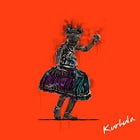Beyond Amapiano: Kelvin Momo's Sewe
An Album Review and Private School Piano masterclass.
On 9 August 2024, eight months after a record-breaking twenty-seven-track masterpiece, Kelvin Momo returned with another triumph: Sewe, a thirty-track album, rich in soulfulness and tranquility. In this work, he cements his status as the often lauded King of Private School Piano; embodying the essence and ultimate expression of the subgenre.
Characterized by its seamless integration of deep-house and jazz melodies, Private School Piano is a unique and distinctive sound. Soft and mellow, it offers a calming and soulful experience that may suffice for healing and spiritual enrichment. Its versatility qualifies as lounging music, setting it apart from mainstream Amapiano. When dancing to it, the aim is never to sweat.
Sewe emerges as a natural continuation of Kurhula, Momo’s previous giving. “Kedi Jazz(Intro)” and “Jazz Cruise” introduce the album with his signature jazz-infused rhythms. Void of vocals, this pair establishes the album’s mood where the listener is invited to reflect and connect with their emotions without vocal dictates. Tracks like “Imvuselelo,” “Hamba Nam,” “Joy Ride,” and “02 July,” create this pseudo-safe space where the listener can confide in Momo, the musical therapist, before the instrumental transitions into vocal bliss. These silent instrumentals speak volumes in their own right, forming a quiet dialogue between the artist and the listener.
In tracks like “Imvelaphi,” “Ubizo,” “Imvuselelo,” “Qaphela,” and “Umdali,” the vibrant rhythmic patterns of percussion—featuring shakers, drums, bells, cymbals, and flute—combined with African chants and whistling, vividly capture the essence of traditional African roots. Vocalists Phila Dlozi(a name meaning ‘the ancestor must live’), Yallunder, Mthunzi and Nia Pearl inject the melodies with an authentic cultural resonance that connects them deeply with the tribal rhythms. Additionally, the theme of divine praise, prevalent in Momo’s projects, is evident here. In “Umdali,” which spans 10 minutes and 20 seconds, Phila Dlozi, Sykes, and Mthunzi offer a prayer, expressing that “it is God who guides our paths, and His word brings hope and blessings.” Similarly, “Themba” is a testament to unwavering faith and trust in God, while “Hlala’nam” echoes this sentiment.
Only two songs fall under the 5-minute mark in the album, while many extend up to seven, eight, and even nine minutes, showcasing an expansive and immersive listening experience.
Stixx, Mzizi, Nia Pearl, Yallunder, Sino Msolo, Makhanj, Xolani Guitars, TBO and Babalwa are familiar favorites on Kelvin Momo projects, having previously worked together on hits that epitomize ‘soulful Amapiano.’ Babalwa’s voice paired with Momo’s production is a formula for success, as evidenced by tracks like “Amalobolo,” “Ikhaya Lam,” “Sukakude,” “Pholisa,” and “Maye Maye” from previous works, as well as “Qaphela” and “Langelihle” from Sewe. “Got The Feeling (Interlude)” features A-Reece, a notable South African hip-hop artist, providing a compelling break from the Amapiano style and highlighting Momo’s range as an artist.
Xolani Guitars' string work deserves special mention. While Sewe lacks the violin and saxophone—key features in Kurhula and Amukelani, the guitar takes center stage in this project. “Funani,” featuring the once-celebrated Queen of Amapiano, BET Award-winning Shasha, is delivered with a soulful arrangement that leaves a lasting impression. Xolani strikes again in “Love Potion” as he’s previously done with “Jazzeneo” in Momo’s Private School and “Tintsumi” in Kurhula.
True to the authenticity of township life, Sewe’s recurring themes include friendship and family dynamics, love and relationships, gratitude for life and success, praises to God, conversations with our forerunners, answering to our callings, the hustle and hard work, and keeping faith and hope alive.
As the album unfolds, Momo transports us to the townships of South Africa; the birthplace of Amapiano. “Hamba Nam” is reminiscent of the old school Deep-house. In “Joy Ride,” “Dona Dona” and “02 July,” Momo pays homage to the genre’s roots: that old school Amapiano where the frantic piano playing shines. I find myself mimicking the piano with my fingers, face squinted and head nodding to the serenading tune. Toss, a fresh face on a Momo project, delivers a Kwaito touch to the album in “Momo 2.0.” Imagine Mandoza or Spikiri on an Amapiano beat, Toss is them personified. “Bonga,” with Sam Deep and Nvcho, a song about gratitude, is also an ode to the hood, blending the piano with sgija elements, adding another layer of fresh dynamism.
Despite his music having earned global acclaim, including a nod from Drake, Momo still aims to further bridge the gap for international crossover. In “Why Do You,” “Afraid,” “Got the Feeling” and “Bone ke” Momo marries hip-pop and R&B soul-type beats with English vocals and rare Amapiano artists. This fusion of sounds pushes the boundaries of Private School Piano, creating room for greater global reach while staying true to his Amapiano roots. The track “Bala,” featuring SYKES released prior to the album, delivers a powerful finale, concluding the album with a memorable impact.
Sewe stands as undeniable proof that Kelvin Momo truly embodies Private School Piano. Yet, whether it surpasses the brilliance of Amukelani and Kurhula is still a matter of debate. The pressing question for top artists is always, "What's next?" It will be fascinating to see how he evolves and redefines his sound, especially with hints of a future EP featuring rapper A-Reece. In the meantime, take a 3-hour and 20-minute drive and immerse yourself in the grandeur of Sewe—it’s an experience worth savoring.




